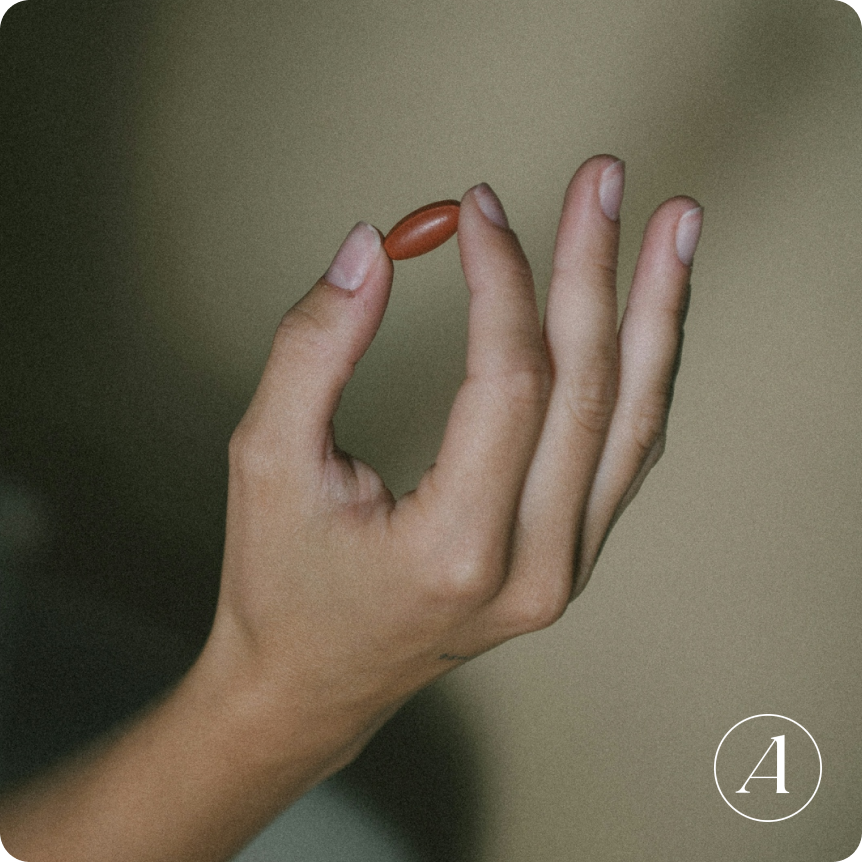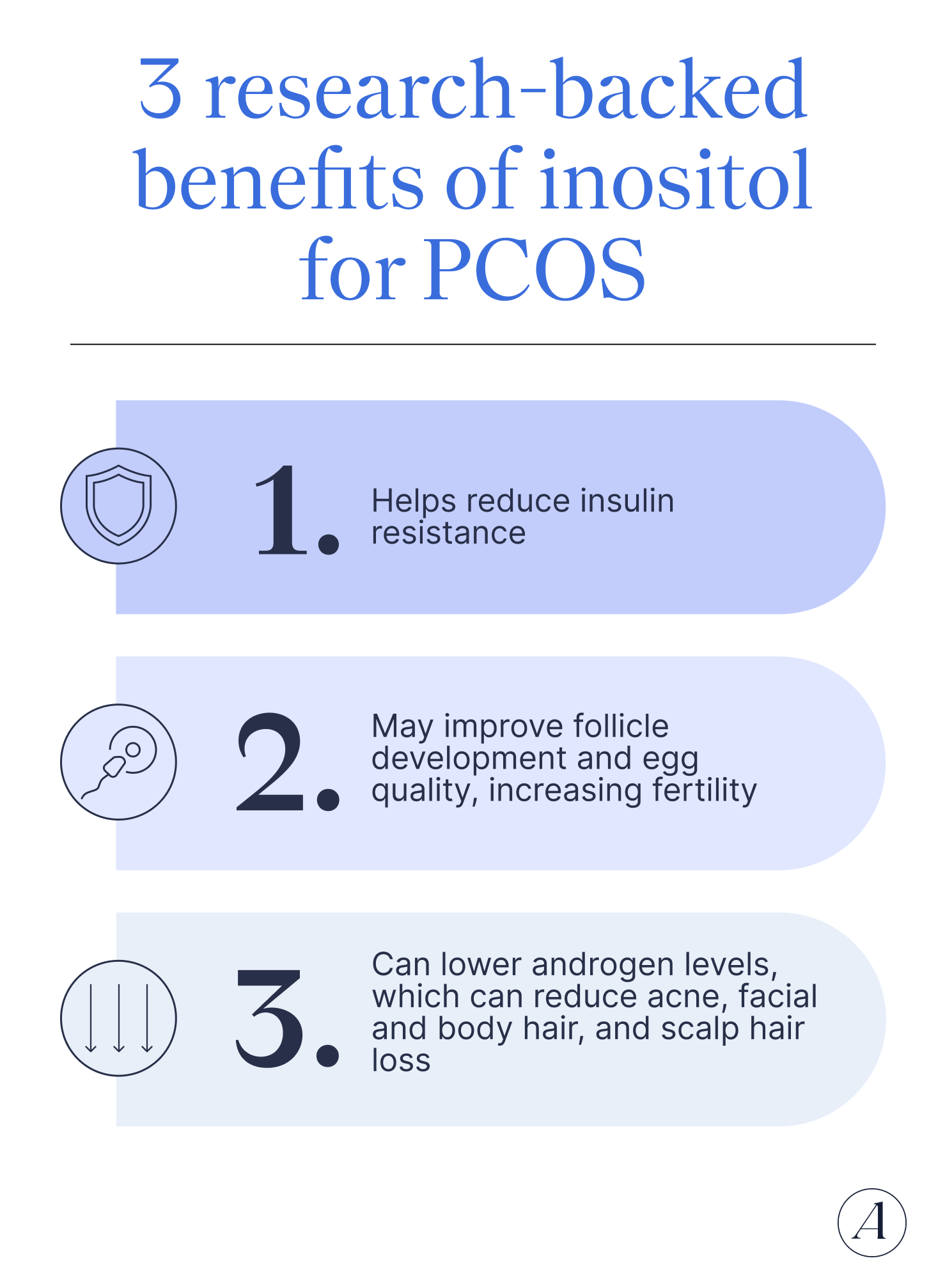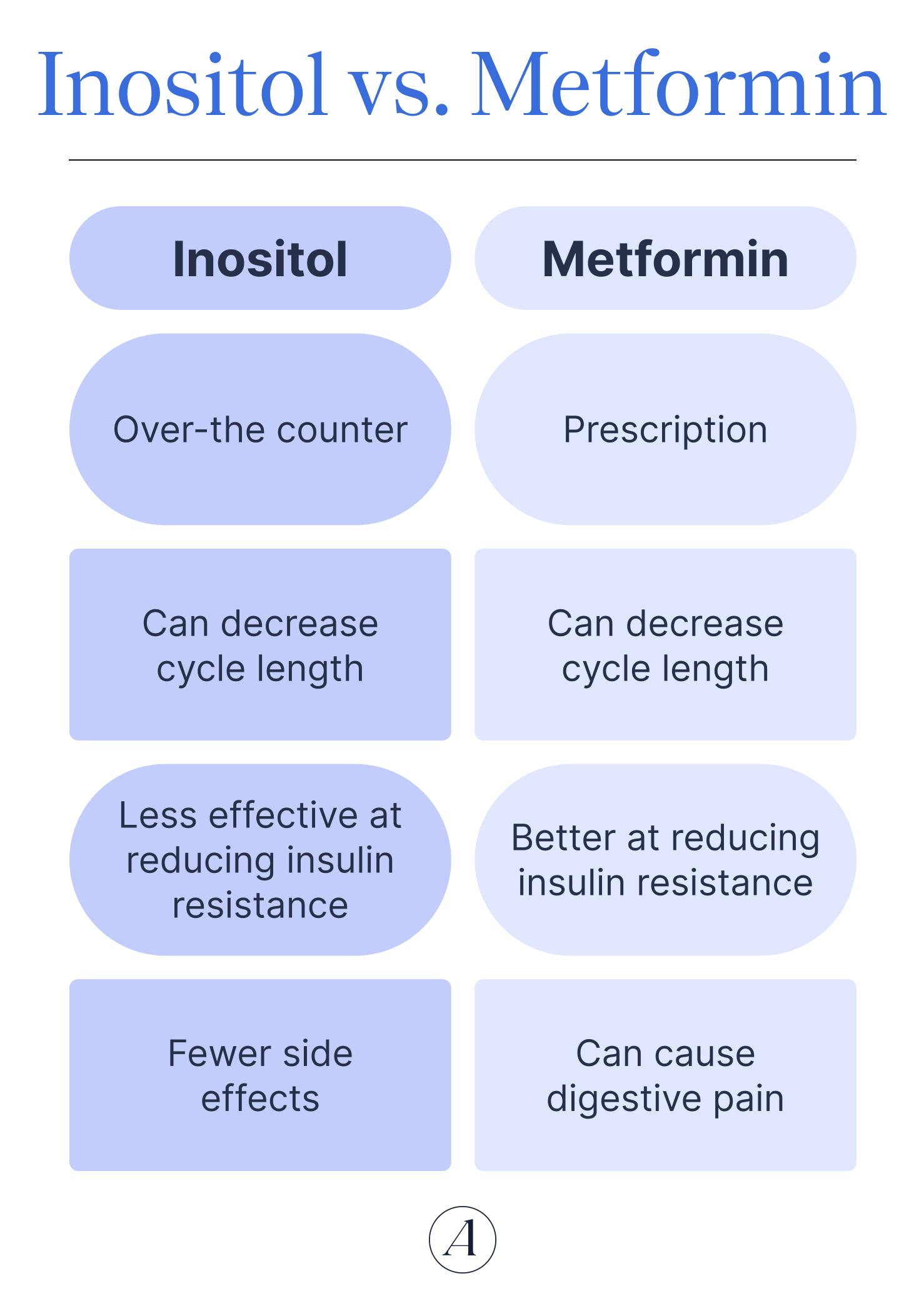
Can inositol help manage PCOS symptoms?
Inositol is a dietary supplement that helps the body use insulin better. For people with PCOS, taking myo-inositol and d-chiro-inositol can improve insulin resistance, improve hormone levels, regulate periods, and reduce symptoms of PCOS associated with high levels of testosterone.
If you have polycystic ovarian syndrome (PCOS), there’s a good chance you’ve heard someone mention taking inositol for PCOS—or maybe you take an inositol supplement yourself. But how, exactly, do inositols help reduce symptoms of PCOS? Let’s start with the basics.
Inositols are sugar-like compounds that exist in the human body and other organic materials, like the food we eat. Inositols act as messengers in cell signaling processes and play an important role in insulin regulation. Approximately 50-75 percent of people with PCOS have insulin resistance, which is when your cells don’t respond normally to insulin. Insulin resistance can lead to high blood sugar levels and disrupt hormone function. Taking inositols can improve your body’s response to insulin, and help reduce symptoms.
Read on to learn more about inositol and PCOS including the benefits of supplementation, dosing, side effects and safety considerations, and other ways you can improve your inositol levels.
What is inositol?
Inositols are polyols, a sugar-like compound that are found within the cell membranes of humans, animals, and plants. Inositols play a role in cellular messaging, helping cells respond to signals from hormones. These molecules can also reduce oxidative stress, a type of cellular damage that accumulates over time, and improve ovarian, brain, and blood vessel health.
There are nine types of inositol: allo-inositol, cis-inositol, d-chiro-inositol, epi-inositol, l-chiro-inositol, muco-inositol, myo-inositol, neo-inositol, and scyllo-inositol. Only two of these types—myo-inositol and d-chiro-inositol—benefit PCOS.
You may hear inositol referred to as vitamin b8, but it’s not technically a vitamin. Vitamins are nutrients needed for survival that aren’t made by the human body. Inositol lost its vitamin classification when scientists discovered the human body can make some forms of it.
Types of inositol: Myo vs. D-Chiro
Myo-inositol (MI) is the most common type of inositol. It is found in humans, animals, plants, and bacteria. In humans, each kidneys produces up to 2 grams of MI per day, 4g total. You can also find myo-inositol in the foods you eat.
D-chiro-inositol (DCI) is another form of inositol. DCI is mainly found in tissues that respond to insulin and acts as a messenger in insulin signaling pathways. D-chiro-inositol is usually taken with myo-inositol as a supplement for PCOS. DCI is less prevalent in the human body.
Typically, blood has a 40:1 ratio of MI to DCI, and ovaries have a 100:1 ratio. If you have PCOS and insulin resistance, your ratios might be different. People with PCOS who have high levels of insulin, often don’t have enough MI in their ovaries. This deficiency can disrupt follicle growth, reduce egg quality, and cause anovulation—a menstrual cycle where you don’t ovulate.
Not having enough myo-inositol can change the ratio of MI to DCI. Having too much d-chiro-inositol can increase androgen levels and lead to PCOS symptoms like increased facial and body hair, acne, and thinning scalp hair.
When supplementing with inositols, research supports taking a 40:1 ratio of myo-inositol to d-chiro-inositol so that it mimics the amount created by your blood. “When taken together, we see the most significant improvements in insulin resistance, lowering androgens (like testosterone), increasing ovulation, improving cycle regularity, and many other aspects of hormonal and metabolic health,” says Allara registered dietitian nutritionist Felice Ramallo, MSCN, RDN, LD/CDN.
Benefits of inositol for PCOS
Inositols are insulin sensitizers, meaning they make your body more sensitive to insulin. When you have insulin resistance, your ovaries work harder to maintain insulin signaling networks. As the ovaries work harder, your body creates more insulin. These high insulin levels make it harder for certain ovarian cells—granulosa cells and oocytes—to respond to follicle-stimulating hormone (FSH).
As these cells become less responsive, you start to produce more gonadotropin-releasing hormone (GnRH) and luteinizing hormone (LH). Consistently high levels of these hormones can disrupt the growth of the follicles and eggs within your ovaries, decreasing fertility. High LH levels can also cause you to produce more androgens like testosterone, and make it harder for your body to convert that testosterone into estrogen. High androgen levels contribute to many PCOS symptoms like excess facial and body hair, acne, scalp hair loss, and irregular menstrual cycles.
When you take inositols, you improve your body’s sensitivity to insulin, which can reduce how much insulin your body creates, and put less strain on your ovaries. Improving insulin resistance will help lower testosterone levels and reduce PCOS symptoms associated with high androgens. You may notice your skin breaking out less frequently, you’re spending less time removing unwanted facial or body hair, or the hair on your head looking fuller instead.
Improving your insulin resistance will also help your ovaries. Lower insulin levels can help normalize your menstrual cycle. Most people with PCOS have long menstrual cycles, and typically get their period eight or less times per year. Some of those cycles may also be anovulatory, meaning the ovaries don’t ovulate or release an egg. Taking inositol can increase how many times you get your period per year, boosting your odds of conceiving if you are trying to get pregnant.
There are other ways taking MI and DCI can improve fertility. Lowering your insulin levels means your ovaries don’t have to work as hard, improving your response to FSH and lowering LH levels. This improved ovarian response can lead to healthier follicle development and improved egg quality.
Other health benefits of inositol include:
- Improved mental health: Myo-inositol may help improve mood-related disorders.
- Potential delays cognitive decline: Studies suggest that other forms of inositol – allo-inositol, epi-inositol, and scyllo-inositol—may decrease the toxic forms of β-amyloid protein that accumulate in the brain when you have Alzheimer’s disease. Insulin resistance is also a risk factor for Alzheimer’s disease, and taking myo-inositol and d-chiro-inositol and reducing insulin resistance may protect against dementia.
- Reduced oxidative stress: Inositols can act similarly to antioxidants and reduce cellular damage from compounds known as free radicals. This can improve cellular health and potentially reduce inflammation.

Insulin resistance and blood sugar control
Insulin is a hormone that allows glucose, a type of sugar, to move from your blood into your cells. When you have insulin resistance, it becomes harder for your cells to respond to insulin. This means your body has to create more insulin to get the same amount of sugar into your cells.
In the early stages of insulin resistance, your pancreas creates more insulin, increasing insulin levels. Eventually, it becomes difficult for your pancreas to keep producing high levels of insulin. When this happens, your blood sugar starts to rise, leading to prediabetes. Over time, without treatment or lifestyle modifications, this insulin resistance and high blood sugar can become type two diabetes. If you have PCOS, you have four times the risk of developing type two diabetes, making blood sugar and insulin regulation all the more important.
Inositol vs. Metformin
Like inositol, Metformin, a prescription medication, is also an insulin sensitizer. Metformin is used as a treatment for insulin resistance because it helps reduce excess body weight, which in turn reduces insulin resistance, and improves cycle length.
Studies comparing metformin to myo-inositol and d-chiro-inositol have found that both can treat insulin resistance. However, metformin typically performs better than the inositols. When it comes to improving cycle length, myo-inositol and d-chiro-inositol work almost as well as Metformin. MI and DCI decreased the average cycle length by nine days and Metformin decreased cycle length by 13 days.
Inositols are also better tolerated than Metformin, which are known to cause digestive symptoms.

Inositol dosage and how to take it
You can take inositol supplements in capsule or powder form. Inositol capsules typically contain 500 mg of inositol, which means you’d have to take eight capsules per day to get the recommended 4g dose for PCOS. If this sounds like too many pills, you can opt for the powder form instead. You can use the same dosage to manage insulin resistance.
Because inositol is a sugar-like compound, the powder tastes mildly sweet, but you likely won’t taste it in your drink if mixed thoroughly.
To maximize inositol’s insulin-sensitizing effects, It is best to take inositol with food. You can split your dose and take 2g in the morning before breakfast and 2g in the evening with dinner.
There is no maximum inositol dosage, Ramallo says. But higher dosages may cause digestive upset. “[Higher doses have] no additional value, so I would not recommend it despite it technically being safe.”
For improved absorption take 2g in the morning, 30 minutes before a meal. Take 2g in the evening before a meal. Total daily dose: 4g of inositol.
Inositol side effects and safety considerations
Inositol is generally safe to take and has few side effects. At very high doses, higher than the recommended 4g for PCOS, inositol may cause digestive upset.
Inositol is a dietary supplement, which means you don’t need a prescription to buy it. Not all supplements are the same, quality-wise. Make sure you pick a brand that has undergone independent testing from a third-party like NSF International, UL, USP, Informed Choice, or Banned Substances Control Group. Stop taking inositol and talk to your health care provider, If you notice any concerning symptoms.
Inositol in food
Inositols, including myo-inositol and d-chiro-inositol, can be found in plants and animals, making them easy to incorporate into your diet whether you’re plant-based or an omnivore. The standard western diet contains up to 1 gram of MI, less than the dosage typically found in MI and DCI supplements.
Foods high in inositols include:
- Beans
- Berries
- Buckwheat
- Citrus
- Eggs
- Lentils
- Liver
- Melon
- Oatmeal
- Quinoa
Ramallo says there isn’t research to suggest that inositols gained from food alone would be enough to reduce PCOS symptoms. “Typically, a 4g per day dose is needed, and the limited studies on dietary concentrations show typical consumption of only 1g.”
There are other dietary changes you can make to help boost inositol levels in your body. “Our gut bacteria can synthesize some forms of inositols,” says Ramallo “By generally working on gut health, and eating prebiotic, fiber-filled foods, to feed our gut bacteria, we may be able to boost concentrations of inositol in the body.”
Frequently Asked Questions (FAQs)
Is inositol safe during pregnancy?
Inositol is safe to take during pregnancy. In fact, research shows it may even help reduce the risk of developing gestational diabetes.
Does inositol cure PCOS?
No, inositol does not cure PCOS. There is no cure for PCOS. PCOS is a chronic health condition, and symptoms can ebb and flow. Inositol can lessen insulin resistance and improve ovarian health. These improvements can reduce PCOS symptoms and even lead to periods where you may have little to no noticeable symptoms.
Can inositol cause weight gain?
Inositol does not typically cause weight gain. Insulin resistance can cause weight gain and excess abdominal weight. Inositol supplements can reduce your insulin resistance, which can lead to weight loss over time.
Taking myo-inositol and d-chiro-inositol can be an effective tool for managing PCOS symptoms, improving insulin resistance, and reducing cycle length. Inositol supplements are generally well tolerated and carry few risks. If you’re interested in trying an inositol supplement, talk to your health care provider. Keeping a log of your PCOS symptoms and cycle length can help you determine whether you’re seeing any improvements.
Key Takeaways
- Inositol helps manage PCOS by improving insulin sensitivity. Lowering excess insulin levels, can reduce androgen production, regulate menstrual cycles, and improve fertility.
- Myo-inositol and d-chiro-inositol in a 40:1 ratio is the most effective inositol for PCOS. This dosage mirrors the natural balance of inositols in your blood and supports ovarian health.
- The typical dosage for PCOS and insulin resistance is about 4 grams per day, often split into 2g in the morning and 2g in the evening.
- Inositol is generally safe to take and well tolerated, but may cause mild digestive upset at doses higher than 4g.
- You can also get inositol from the foods you eat, but diet alone usually isn’t enough to reach the therapeutic dose used for PCOS.











